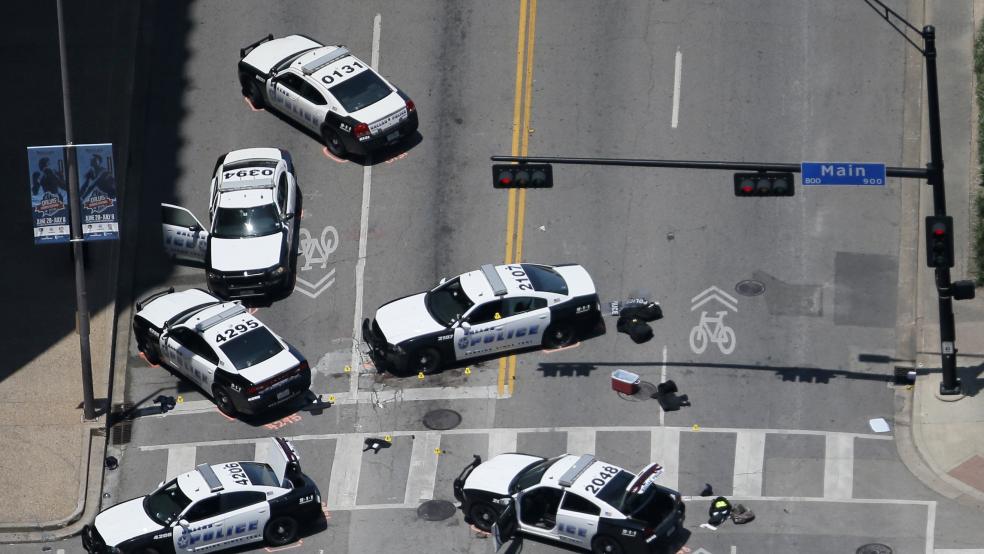After a week of high-profile violence perpetrated both by and against police officers, leaders across the country issued ritual calls for calm and made broad declarations about the need for police officers and the communities where they work to come to some sort of mutual understanding. To “stop talking past each other” and to be “partners” in a conversation about the country’s racial tensions.
If it all sounds very familiar, that’s because we’ve heard it before. In the wake of the Michael Brown shooting and the protests that followed in Ferguson, Missouri. After Eric Garner’s death after being placed in a chokehold by police and the protests that followed. After Freddie Gray. After Tamir Rice. After so many, many others.
Related: Tragic Shootings Bring Out the Best in Trump and Gingrich
Now we’ve begun to hear it again after five police officers guarding a protest against police violence against black Americans were gunned down in Dallas last week by a black man seeking to retaliate against white police. Then, on Saturday night, people were arrested by the scores in Minnesota and Louisiana, when protests of last week’s police shootings of two African American men turned violent or disruptive.
Homeland Security Secretary Jeh Johnson, who was the Obama administration’s envoy to the Sunday talk shows this morning, may have set a record for banality in his analysis of the situation.
“Violence never solves anything,” he said. “An eye for an eye leaves everybody blind, and this is a time to heal, a time to come together, a time to mourn”
It’s all become so repetitive, in fact, that it’s a testament to the self-control of Cornell William Brooks, president and CEO of the National Association for the Advancement of Colored People that he didn’t beat his head on the desk Sunday morning when Face the Nation host John Dickerson asked him to talk about what needs to be done. Because, as he explained, we already do know -- we just aren’t doing it.
Related: Americans Can’t Stop Watching this Car Wreck of an Election
“Everybody on both sides is saying don't paint the other with a broad brush,” Dickerson said. “Help people understand how to talk about the changes you think need to be made in the police force, but then also respect these people who are brave and take risks and serve their community.”
“We're at a moment where we know what to do,” Brooks said. “The president has issued his task force -- recommendations from his 21st Century Policing Task Force. The NAACP issued a report called "Born Suspect." We have police departments that know how to get it right. We just have to develop the will to get it right.”
Brooks mentioned a number of concrete steps, including passing, at the federal level, the End Racial Profiling Act and the Law Enforcement Trust and Integrity Act. He called for state level action to pass racial profiling laws, police body camera and dashboard camera laws, and establishing civilian police review boards.
“The point being here is, we know what to do legislatively,” Brooks repeated. “We know what to do from a policy perspective. But at the end of the day, John, to bring about the kind of change we need, we need to ensure that every demonstrator is a voter and that we show up en masse and in the millions at the polls in November, because we need to bring about reform at the state and municipal and at the federal level, and, of course, call upon our presidential candidates to take racial profiling seriously and address it in their party platforms and in their campaigns.”
Related: GOP Calls for Unity, but Trump Shows Just How Hard that Will Be
Given the state of the presidential campaign, that last hope may be in vain, but at least one member of the Senate said that he expects both the presumptive Republican nominee, Donald Trump, and the presumptive Democratic nominee, Hillary Clinton, to make an effort.
“I think both of the candidates, their challenge over the coming weeks is to show that they can do that, and I think there is going to be a sincere effort in the Trump campaign to do so,” said Tennessee Sen. Bob Corker. “My guess is the same thing will be happening in the Clinton campaign.”
“I hope that both of these candidates candidly will rise to the occasion and on this particular issue bring people together,” Corker said.
However, his Democratic colleague Sen. Corey Booker of New Jersey was skeptical, at least with regard to Trump, who has generally inflamed racial tensions with his rhetoric rather than cooling them.
“Words matter,” Booker said. “When I hear a presidential candidate like Donald Trump gratuitously demeaning women, demeaning Muslims, demeaning Latinos, at a time when our country needs reconciliation? We need people that bind our wounds and build bridges across out chasms. To see someone so callously stoking hate and fear and inflaming divide...this is not the person to be president of the United States.”





